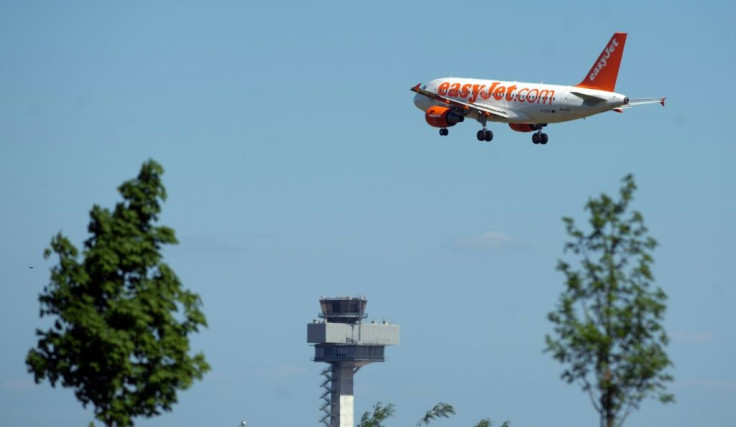Virgin Atlantic To Ask UK Government For Bailout, While EasyJet Grounds Entire Fleet

KEY POINTS
- Sir Richard Branson offered to inject £250 million into the airline’s parent, Virgin Group
- EasyJet has grounded its entire fleet of 344 aircraft
- Easyjet claimed it will not need a government bailout to survive
Virgin Atlantic, an airline devastated by the coronavirus pandemic, will ask the British government for hundreds of millions of pounds in commercial loans and guarantees within the next few days, BBC reported.
Such loans would reportedly be used to cover fixed costs, not to pay staff.
However, there has been some confusion about how the government will treat struggling airlines hammered by the coronavirus pandemic. Last week, Chancellor of the Exchequer Rishi Sunak warned airlines that they should seek funding elsewhere before asking the government for help. Sunak noted a government bailout would only be used "as a last resort" and on a case-by-case basis.
But Transport Secretary Grant Shapps has said the government might consider taking equity stakes in airlines in exchange for state funds.
"It was important to save companies that would survive in normal times,” Shapps said, while adding that airlines’ current stockholders "must [also] be part of the solution.”
Virgin Atlantic’s founder Sir Richard Branson has himself offered to inject £250 million ($310 million) into the airline’s parent, Virgin Group, with most of that cash going to the carrier.
Virgin Atlantic lacks the cash reserves held by bigger competitors like British Airways or EasyJet. The carrier’s bookings have virtually vanished and nearly the entire workforce has been placed on unpaid leave.
The International Air Transport Association earlier warned of an "apocalypse" in the aviation industry if governments around the world do not offer airlines financial support.
But author, risk analyst and statistician Nassim Nicholas Taleb said he thinks Virgin Atlantic should be made to collapse. Taleb specifically criticized Branson as a “tax refugee.”
“[Branson] lives in the British Virgin Islands and since the U.K. has no worldwide taxation, [he] pays no taxes,” Taleb tweeted. “[Yet he] wants the U.K. taxpayer's backstop. Let him go bust. Planes will fly with new owners.”
Meanwhile, British budget air carrier EasyJet said it has grounded its entire fleet of 344 aircraft due to "unprecedented travel restrictions" caused by the global coronavirus pandemic. The airline also warned it cannot project when it will resume operations.
EasyJet had already cancelled most of its flights but had recently staged 650 rescue missions to repatriate about 45,000 Britons who were stranded overseas.
"We will continue to work with government bodies to operate additional rescue flights as requested," it said.
The airline said its 4,000-member cabin crew will be furloughed for two months, with staff receiving 80% of their wages from Apr. 1 under the auspices of the British government's job retention scheme.
Johan Lundgren, EasyJet’s CEO, said he is "working tirelessly" to make sure the airline is "well positioned to overcome the challenges of coronavirus.”
"I am extremely proud of the way in which people across EasyJet have given their absolute best at such a challenging time," he added.
However, Easyjet said on Monday it will not need a government bailout to survive.
"We have no plans currently to ask the government for bespoke support as outlined by the chancellor [Rishi Sunak]," it said. "To support recovery in the future, we believe that further actions will be needed such as a temporary removal of aviation passenger duty [tax] and air traffic control charges."
“We think [EasyJet] has enough liquidity to manage a short suspension of European air travel but if the disruption [caused by the virus] proves prolonged, or the recovery is sluggish, easyJet could be in real trouble,” said William Ryder, an analyst at Hargreaves Landsdown.
In addition, EasyJet’s biggest stockholder, Stelios Haji-Ioannou, who along with his family owns about a 33% stake in the company, said the airline must either cancel or renegotiate the terms of a 4.5 billion pound [$5.6 billion] order for 107 planes from Airbus since the additional aircraft would destroy shareholder value.
EasyJet said in response it will seek to reduce payments on those aircraft which are due between 2020 and 2023.
Haji-Ioannou also told the airline to seek money from shareholders. He also threatened to remove the company’s board members.
The airline asserted that it is focused on short-term liquidity, as well as cutting costs and reducing other payments where possible.
Another British carrier, the Glasgow, Scotland-based Loganair, which operates regional routes to some of the U.K.'s most remote airports, such as Barra in the Outer Hebrides in Scotland, has also asked for government financial support.
Loganair chief executive Jonathan Hinkles said airlines were unlikely to survive without a bailout from the government. He noted that airlines which claim they don’t need state aid "would probably be lying.”
Hinkles added that airlines like his provide critical services for people living in remote and rural locations. The connectivity of such places "cannot be maintained without air services,” and that government support for Loganair was "essential.”
"We can't just shut down,” Hinkles said. "Morally, we have to fly."
Loganair has already grounded half of its fleet, and drastically cut its schedule.
A spokesperson for the Department for Transport said that the aviation industry is "important to the U.K. economy.”
"We are willing to consider the situation of individual firms, so long as all other government schemes have been explored and all commercial options exhausted, including raising capital from existing investors," the spokesperson added.
© Copyright IBTimes 2025. All rights reserved.





















